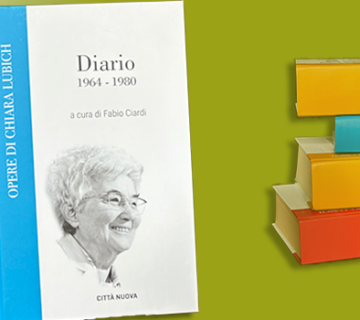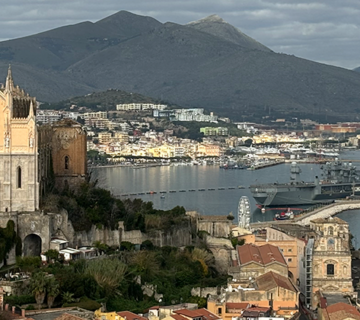
– The golden thread
– Rome in the 1940s during the bombings
– The discovery
– No one came her way in vain
– The departure
The golden thread
“Only in Paradise shall we read our complete story. There we shall see in its entirety the golden thread which, hopefully, will bring us to where we should arrive.” With these words, Renata once began narrating her life story, which she discovered to be wholly interwoven with the love of God.
She was born on May 30, 1930 in Aurelia, a small city of the Latium region. Later, she and her family moved to Rome.
The members of her family were not churchgoers. They were upright people, sincere and rich in human values. “I shall never stop thanking God,” Renata used to say, “for letting me experience what a true family is, and this is due most of all to the love my parents had for each other.”
 Renata was 10 years old when World War II broke out. A sensitive person by nature, she was far from indifferent to what was happening around her, and some incisive moments remained particularly imprinted in her memory.
Renata was 10 years old when World War II broke out. A sensitive person by nature, she was far from indifferent to what was happening around her, and some incisive moments remained particularly imprinted in her memory.
Rome in the 1940s during the bombings
On July 13, 1943, as she saw the bombs falling, she decided to give her life another direction. She wrote: “I realized that death could come anytime, and as if in a flash, I understood the vanity of games, money, of the future. It was a moment of grace… When I went back home, I felt different. I had decided to become a better person.”
All of a sudden, one of her schoolmates, a very bright girl, disappeared. She was Jewish. “Why are they killing the Jews? Are they not just like us?” she asked herself, insistently demanding an explanation from her father.
On September 8, 1943, a decisive date in Italian history, from the balcony of her house she saw a German soldier closely clinging to the wall as he slowly tried slip away unseen, like someone who was cringing with fear. Renata was filled with compassion for him and his people…
Images buried by time, yet they already tell us that love without measure – for the human person, for all human beings – would later be a dominant factor in her life. As she grew up, her need for a challenging faith life also grew, and the “question” of God made itself felt. She began frequenting the church, she joined a Marian association, and her favorite teachers were those she considered morally upright.
At 14 years of age, she felt some kind of “a first calling”: an interior push to offer her life so that her family would find the faith.
From age 15 to 19, in her thirst for the truth, she threw herself into her studies, desirous of penetrating the deepest truths as she searched for God. She enrolled in the Faculty of Chemistry, because she hoped to discover Him by penetrating the secrets of the universe. “Mathematics became my passion because of its logic. I was thrilled each time I discovered something new. I hoped to gain a kind of knowledge that would somehow allow me to embrace the universal. I searched for God wherever his reflection could be found. I did not yet know that only in the Creator who is Love could I discover and love all created life.”
The discovery
On May 8, 1949, a day which Renata would later describe as “extraordinary”, while somewhat hesitant about taking time away from her studies, she attended a meeting where Graziella De Luca, one of the first companions of Chiara Lubich, spoke of the re-discovery of God as Love, of a new evangelical lifestyle which had started in Trent a few years back, while the war was raging.
“I do not remember exactly what she said. I do remember that when I came out of that meeting, I knew I had found it. (…) I had the intuition that God is Love. That experience penetrated the innermost depths of my being. I lost the image of God as a harsh judge who punishes the bad and rewards the good, and I saw him as a God who is close to us.”
Convinced that she had a calling from God, she gave another decisive turn to her life. Soon afterwards, she met Chiara personally and immediately sensed a strong bond with her, a vital link as that of a child with her mother. She also felt a clear confirmation that she was called to give her life to God in the Focolare Movement. She said her yes to God forever.
 A long experience of faithfulness to this ’yes’ began on August 15, 1950. She had just turned 20. Her young age, her capacity to love, her selfless giving and her peace did not go unnoticed. Renata spent 40 years at the service of the Focolare Movement, first at different focolare centers in Italy, then in Grenoble, France.
A long experience of faithfulness to this ’yes’ began on August 15, 1950. She had just turned 20. Her young age, her capacity to love, her selfless giving and her peace did not go unnoticed. Renata spent 40 years at the service of the Focolare Movement, first at different focolare centers in Italy, then in Grenoble, France.
In 1967, at 37 years of age, Renata was asked to assume the position of co-director of the little town of the Movement at Loppiano, in particular of the women’s school of formation, where she spent 23 years. Here, her self-giving blossomed in full force. From her, over a thousand young women received wisdom and the inner strength necessary for their spiritual growth.
 No one came her way in vain
No one came her way in vain
Her life was a wonderful interweaving of love and suffering, as she strove to die to herself to let Jesus live in her. And indeed what others found in her presence was Jesus.
Because of her measureless love, no one came her way in vain, as numerous persons of all ages and backgrounds testify. Anyone who came in contact with her experienced her love. A love which made them feel God’s personal love.
The root of her deep love for every person lay in her unconditional love for Jesus on the cross who cried out when he felt abandoned by the Father, and in her looking up to Mary as her model who, before her dying Son, continued to believe, hope and love. This was the impelling force of her continual ascent, lived in the guidance of the Gospel words which became her life program, almost like a sketch of her spiritual features: “Mary kept all these things, meditating on them, in her heart” (Lk 2,19). From her intelligent and constant self-denial blossomed her constant thrust towards holiness of life, her growth in virtue, her faithful adherence to her founder’s charism, “May they all be one” (Jn 17,21).
The departure
When she was 59, she was diagnosed with an illness which soon proved to be extremely serious. She had only a few months to live. From that moment on, her life took off in its flight to God. Meanwhile she remained always happy, just as she had promised Jesus many years before.
Her sickbed became a pulpit. In Christ, there is no death, there is life, she often said, and she kept repeating it up to her last moment: “I want to bear witness that death is life.”
Renata never complained about her sufferings, and refused pain-killers. She wanted her head to be clear, in order to be ever ready to say her full yes to the God who had fascinated her since her youth and was now asking her for the gift of her life. In her final days, even when in pain, she radiated fullness of joy. “I am in a sort of abyss of love. I am too happy,” she said. With paradise in her heart, she went to meet her Spouse on February 27, 1990.
(Renata Borlone’s complete biography is entitled “Un silenzio che si fa vita” by G. Marchesi and A. Zirondoli – Città Nuova Publications)


 Italiano
Italiano Español
Español Français
Français Português
Português


